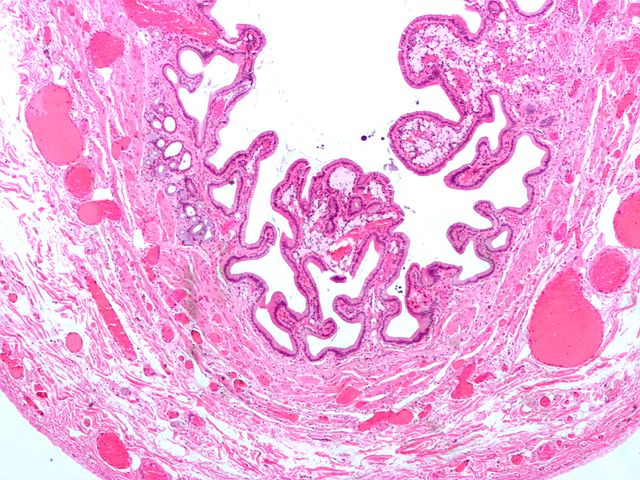Chronic cholecystitis pathophysiology
| https://https://www.youtube.com/watch?v=aU1lWPzUZgY%7C350}} |
Editor-In-Chief: C. Michael Gibson, M.S., M.D. [1]; Associate Editor(s)-in-Chief: Aditya Govindavarjhulla, M.B.B.S. [2]
|
Chronic cholecystitis Microchapters |
|
Diagnosis |
|---|
|
Treatment |
|
Case Studies |
|
Chronic cholecystitis pathophysiology On the Web |
|
American Roentgen Ray Society Images of Chronic cholecystitis pathophysiology |
|
Risk calculators and risk factors for Chronic cholecystitis pathophysiology |
Overview
Pathophysiology
Acute Cholecystitis
Cholecystitis is caused by an obstruction of the bile duct due to impaction of a gall stone.[1] Gall stone impaction leads to damage of the mucosal surface of the gallbladder and bile stasis. Factors which induce cholecystits are
- Lithogenic bile
- Duct obstruction
Acute inflammation is not always necessary for the development of acute cholecystitis.
Gallstones are one of the major causes of cholecystitis. These cause physical obstruction to the lumen of the neck or cystic duct. This results in an increase in the intraluminal pressure. The degree and duration of obstruction are the two main factors that determine its progression. [2]
- If the obstruction is partial and of short duration, the patient may experience biliary colic and in the long term, it may progress to chronic cholecystitis.
- If the obstruction is complete and of longer duration, the patient can develop acute cholecystitis.
Chronic Cholecystitis
Some studies suggest that the pancreatic biliary reflux plays a role as a co factor for the development of chronic cholecystitis. Occult pancreatic biliary reflux can be diagnosed by measuring the levels of biliary amylase. [3]
Acute Acalculous Cholecystitis
Gallbladder Ischemia/Reperfusion Injury[4]
- Prolonged periods of ischemia to the gall bladder leads to disruption of the normal mucosal surface.
- Lipopolysaccharides are exposed leading to activation of various coagulation cascades.
- Reperfusion leads to an increased humoral response which leads to further damage causing cholecystitis.
Bile Stasis[4]
- Loss of fluids, opioid drugs, positive pressure ventilation, and other factors cause an increased concentration of bile in the biliary tracts.
- Bile contains phosphatidyl choline, which in increased concentrations can cause mucosal disruption.
Pathology
Chornic Cholecystitis
{{#ev:youtube|gxGvP3GV_1E}}

|
References
- ↑ Roslyn JJ, DenBesten L, Thompson JE, Silverman BF (1980). "Roles of lithogenic bile and cystic duct occlusion in the pathogenesis of acute cholecystitis". American Journal of Surgery. 140 (1): 126–30. PMID 7396076. Retrieved 2012-08-20. Unknown parameter
|month=ignored (help) - ↑ "Definitions, pathophysiology, and epidemiology of acute cholangitis and cholecystitis: Tokyo Guidelines". Retrieved 22 September 2012.
- ↑ Amr AR, Hamdy HM, Nasr MM, Hedaya MS, Hassan AM (2012). "Effect of pancreatic biliary reflux as a cofactor in cholecystitis". Journal of the Egyptian Society of Parasitology. 42 (1): 121–8. PMID 22662601. Unknown parameter
|month=ignored (help);|access-date=requires|url=(help) - ↑ 4.0 4.1 "Acute acalculous cholecystitis - Surgical Treatment - NCBI Bookshelf". Retrieved 2012-08-20.
- ↑ "Acute cholecystitis - Libre Pathology".